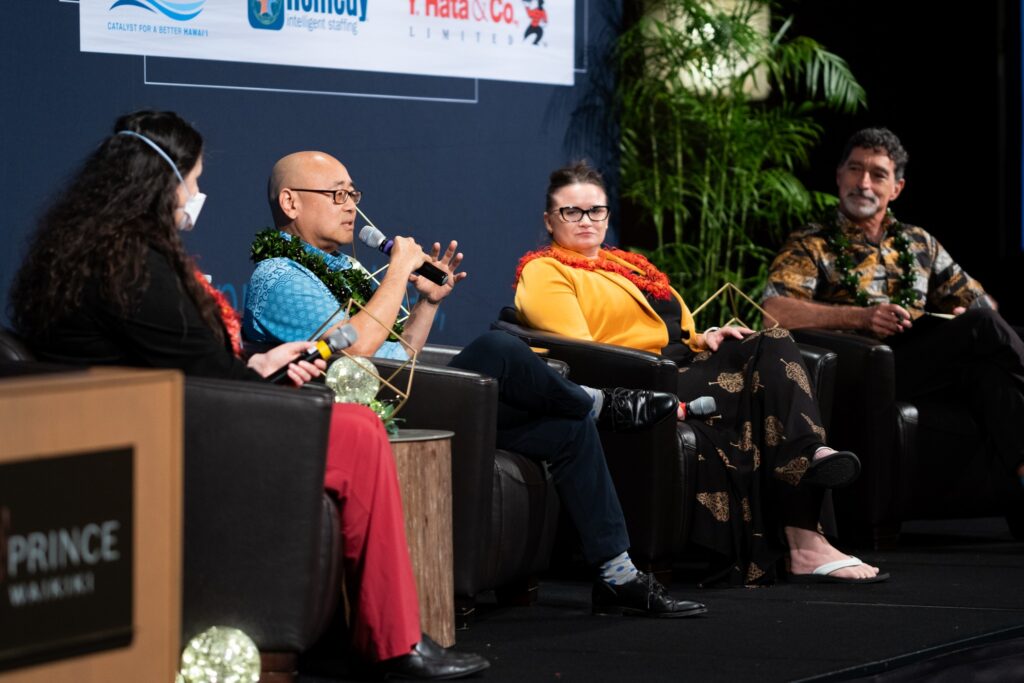
Written by ChatGPT
Edited by Jodie Chiemi Ching
Editor’s note: Before attending this event, I was definitely one fearing the unknown of AI. And, actually, I still am, but a little less so after listening to the panelists share their opinions about the implementation of AI. I thought it would be appropriate to dip my toe in the water and ask Chat GPT to write this article. In my opinion, the article is accurate but lacks a certain flair that (for now) can only come from humans. It’s vanilla. I felt the article left out a crucial point about the potential for Hawaiʻi to be a model for the world because of our diverse multi-ethnic population. I changed the title and added the last few sentences at the end to reflect that. Otherwise, I left the rest of the article as is so you can decide for yourself the competence of ChatGPT as a journalist.
On May 23, 2024, the Honolulu Japanese Chamber of Commerce hosted a highly engaging AI Game Changers Discussion Panel at the Hawaii Prince Hotel. The event, moderated by Mark Hines (Director, Kupu Hou Academy, Mid-Pacific Institute), brought together distinguished panelists: Ian Kitajima (President, Pacific International Center for High Technology Research – PICHTR), Jenifer Sunrise Winter, Ph.D. (Professor of Communication, University of Hawaii at Manoa), and Summer Rankin, Ph.D. (Lead Associate Senior Lead Data Scientist, Booz Allen Hamilton). This panel aimed to delve into the current AI landscape, its impacts across various sectors, and the potential challenges ahead.
Setting the Scene
The event began with an explanation of the decor which set a futuristic tone, incorporating AI-recommended colors like metallic blue and vibrant orange to evoke a high-tech atmosphere. The emcee provided a foundational understanding of AI using a YouTube video, explaining its basic concepts and illustrating its capabilities with practical examples, such as Chat GPT’s travel suggestions for Hokkaido, Japan.
Panelist Introductions
Mark Hines introduced the panelists, each bringing a unique perspective to the discussion. Jenifer Winter emphasized the longstanding integration of AI with other technologies such as big data and the Internet of Things (IoT). Ian Kitajima shared his journey from setting up an AI lab at Oceanit to solving complex problems at PICHTR. Summer Rankin discussed her transition from computational neuroscience to federal contracts, highlighting her work on modeling brain activity and creativity.
Diverse Perspectives on AI
The first question posed by Mark Hines addressed the panelists’ views on the current AI landscape and its societal integration. Jenifer Winter underscored the importance of data governance and the need to address biases within AI systems. She emphasized that AI is not an isolated technology but one that works in concert with various other systems, highlighting the critical role of data in driving AI applications.
Ian Kitajima drew parallels between the advent of the internet in 1995 and the current AI revolution. He stressed that the key to overcoming the fear of AI lies in practical experimentation, suggesting that businesses start with simple, time-saving applications. For instance, using AI to summarize lengthy documents can significantly improve efficiency.
Summer Rankin focused on the infrastructure and security implications of AI, cautioning against potential cybersecurity risks and advocating for the responsible use of existing AI tools. She highlighted the necessity of developing human skills like creativity and empathy, which AI cannot replicate.
Interactive Insights
Mark Hines incorporated real-time AI interaction by prompting Chat GPT for summaries and insights. This interactive element demonstrated AI’s capability to provide concise and relevant feedback based on the panel discussion. Chat GPT emphasized the panelists’ points on data governance, practical applications, and the importance of human skills alongside AI.
Future Directions and Considerations
The panelists also explored the future trajectory of AI. Jenifer Winter predicted the integration of quantum computing with AI, which could further accelerate technological advancements. She advised businesses to establish robust governance strategies now to navigate these future changes effectively.
Ian Kitajima shared a visionary perspective, highlighting that AI could eventually perform many human tasks, necessitating a focus on creativity and teamwork. He introduced the concept of an “empathy economy,” where human qualities would become increasingly vital in a technologically advanced world.
Summer Rankin likened the current AI revolution to the invention of the printing press, underscoring the paradigm shift it represents. She stressed the importance of continuous learning and adaptation, particularly for sectors with significant stakes in AI’s accuracy and fairness.
Conclusion
The AI Game Changers Discussion Panel provided a comprehensive overview of the current state and future potential of AI. It highlighted the importance of practical applications, data governance, and the development of human skills to complement AI. As businesses and individuals navigate this rapidly evolving landscape, the insights from this panel offer valuable guidance on harnessing AI’s benefits while addressing its challenges. Hawaiʻi can be a major player in AI because of the diversity of people that live here. In Kitajima’s opinion, “Hawaiʻi can be a model of setting precedence and policies.” Maybe we can call it Aloha Intelligence.